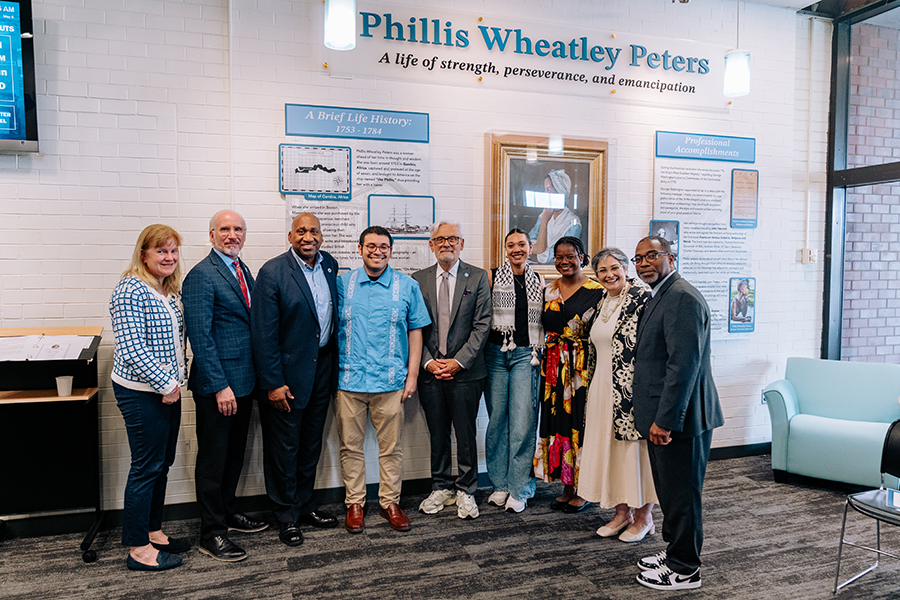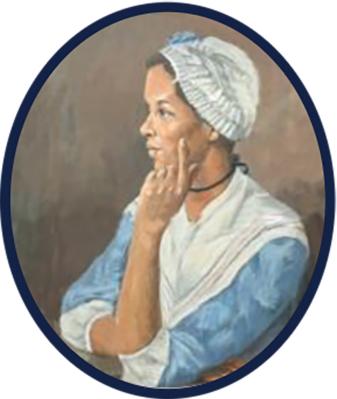- Home
- News
- Recent News
- UMass Boston Honors Poet with Heritage Building Naming Update
UMass Boston Honors Poet with Heritage Building Naming Update
Phillis Wheatley Peters Hall stands as a living testament to her legacy—and to the enduring power of student-led change.

In a ceremony held on what would have been her 272nd birthday, UMass Boston officially updated the name of one of its heritage buildings to Phillis Wheatley Peters Hall.
The update marks a moment of recognition and restoration for 18th century poet and intellectual Phillis Wheatley Peters—the first American slave, the first person of African descent, and only the third colonial American woman to have her work published.
“When I entered UMass Boston, I had no idea who Phillis Wheatley Peters was,” said incoming Undergraduate Student Government President Cristian Orellana. “It was through me inquiring and searching online about Phillis Wheatley Peters’ life that I learned why she was so important to our community. … I'm joyful that we can celebrate the legacy and words that are still being taught in this building that bears her full name now on our diverse campus almost 250 years later.”
Orellana, also a student member of the Restorative Justice Commission, spearheaded a proposal that called for updating the hall’s name from Phillis Wheatley Hall to Phillis Wheatley Peters Hall.
Phillis Wheatley Peters, born around 1753 in Gambia, Africa, was kidnapped and enslaved at the age of seven. Transported to Boston aboard the slave ship The Phillis, she was purchased by the Wheatley family, who educated her. Her talent emerged early, and she published her first poem at age 13. She would go on to publish a collection of 28 poems, becoming a symbol for abolitionists of Black intellectual and artistic capacity.
After gaining her freedom in 1773, she married John Peters, a free Black man. Wheatley Peters died at 31 in poverty, having outlived her children, but left behind a body of work that still resonates today.

Updating the name to Phillis Wheatley Peters honors the poet’s full identity, including her marriage to John Peters, and acknowledges her life beyond enslavement as a free Black woman, writer, and wife—restoring agency and historical accuracy to her legacy.
“As students, we recognize this proposal as, yes, a reflection of UMass Boston's commitment to anti-racism and the motto ‘for the times,’ but moreover, what this campus and community meant to us,” said fourth-year communication major Christelle Joseph, current president of the Undergraduate Student Government. “A marker of how far we have come and how much further we have to go. It was a no-brainer. The proposal passed our committee unanimously.”
Orellana’s proposal was widely supported across the UMass Boston community, with endorsements from several academic departments, as well as the Black Faculty & Staff Association and the Restorative Justice Commission.
Vice Chancellor for Student Affairs Karen Ferrer-Muñiz framed the occasion as being more than symbolic.
“Let us remember that this ceremony is not only about updating the name of a building,” she said. “It is about honoring the life and the legacy of a woman who illuminates history and continues to inspire future generations.”
Chancellor Marcelo Suárez-Orozco celebrated the naming update as a deeply meaningful gesture.
“It is a gesture that advances everything our university stands for,” he said. “Symbolic actions take many forms. And in updating the name of the building to Phillis Wheatley Peters Hall, we are reaffirming the sentiment that UMass Boston is a place where everyone can feel like they belong. Today, this heritage building is reborn and now stands as a reminder of a university community that creates opportunities for the underserved.”
Calling her a "profoundly important poetess," Suárez-Orozco recounted her legacy.
“Phillis Wheatley Peters was born into slavery, but by virtue of her will to become educated, embraced opportunities to express herself in writing beautifully, creatively, imaginatively, and freely.”
State Representative Russell Holmes also attended the ceremony, showing support for the university’s effort to honor Peters’ legacy. Jordan Cherry, a clinical psychology student, added to the celebration with a reading of Wheatley Peters’ poem A Hymn to the Evening.
Joseph closed her remarks with a call to action.
“With relentless attacks on inclusion and diversity, and the erasure of the contributions of people of color, let this recognition of her life and work be a reminder of our commitment to uphold the legacy of those who have come before us. To my fellow students, you have the power to be a factor, to correct the injustices we face. Find those collaborators and enact the change you wish to see.”